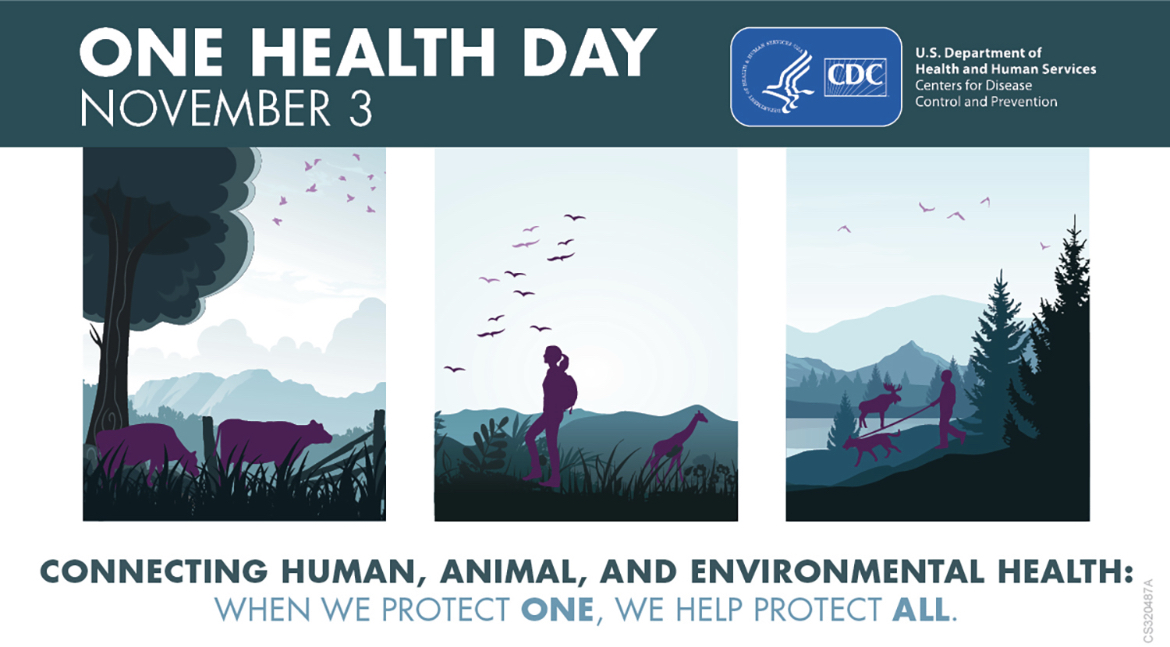Delaware Celebrates Health for All on One Health Day and Every Day
Delaware Health and Social Services | Division of Public Health | Date Posted: Friday, November 3, 2023
Delaware Health and Social Services | Division of Public Health | Date Posted: Friday, November 3, 2023

To recognize the interconnectedness between the health of people, animals and the environment we share, the Delaware Division of Public Health (DPH) celebrates One Health Day on November 3, 2023. Today, we are awakening to the fact that without open discussions and mutual understanding, we are unable to solve issues such as climate change, pandemics and food insecurity. According to DPH, the One Health approach helps us work together towards a common goal: preserving tomorrow starting today.
In the United States and around the world, One Health is gaining popularity as an effective way to combat zoonotic diseases and other health issues. By involving experts from human, animal, environmental and other relevant disciplines and sectors, the CDC monitors and controls public health threats and learns about how diseases spread among humans, animals, plants and the environment. Efforts to improve public health require the cooperation of partners from the fields of animal, human and environmental health. The interaction between animals, humans and the environment cannot be handled by one person, organization or sector alone.
After the Ebola crisis in Africa and the Avian Influenza outbreak in the U.S. in 2014, Delaware began embracing the One Health concept. During this time, One Health was called a “New Beginning.” A number of health concerns are shared by people, animals and the environment, including emerging, re-emerging, and endemic diseases, neglected tropical diseases, vector-borne diseases, antimicrobial resistance, food safety, food security, environmental contamination and climate change.
“Animals also share our susceptibility to some diseases and environmental hazards,” said State Public Health Veterinarian Dr. Doug Riley. “Because of this, they can sometimes serve as early warning signs of potential human illness. For example, birds often die of West Nile Virus before people in the same area get sick with West Nile Virus infection.”
There are a number of areas that One Health can address in Delaware, including:
Collaboration across all sectors allows a One Health approach to achieve the best health outcomes across people, animals and plants through:
“We must embrace the reality that we are all interdependent and that our home, Mother Earth, needs to be cared for and nurtured,” said Riley. “By promoting collaboration across all sectors, a One Health approach can achieve the best health outcomes for people, animals and plants in a shared environment.”
For more information about One Health initiatives, visit: https://www.dhss.delaware.gov/dhss/dph/epi/onehealth.html or call 302-744-4990.
Keep up to date by receiving a daily digest email, around noon, of current news release posts from state agencies on news.delaware.gov.
Here you can subscribe to future news updates.
Delaware Health and Social Services | Division of Public Health | Date Posted: Friday, November 3, 2023

To recognize the interconnectedness between the health of people, animals and the environment we share, the Delaware Division of Public Health (DPH) celebrates One Health Day on November 3, 2023. Today, we are awakening to the fact that without open discussions and mutual understanding, we are unable to solve issues such as climate change, pandemics and food insecurity. According to DPH, the One Health approach helps us work together towards a common goal: preserving tomorrow starting today.
In the United States and around the world, One Health is gaining popularity as an effective way to combat zoonotic diseases and other health issues. By involving experts from human, animal, environmental and other relevant disciplines and sectors, the CDC monitors and controls public health threats and learns about how diseases spread among humans, animals, plants and the environment. Efforts to improve public health require the cooperation of partners from the fields of animal, human and environmental health. The interaction between animals, humans and the environment cannot be handled by one person, organization or sector alone.
After the Ebola crisis in Africa and the Avian Influenza outbreak in the U.S. in 2014, Delaware began embracing the One Health concept. During this time, One Health was called a “New Beginning.” A number of health concerns are shared by people, animals and the environment, including emerging, re-emerging, and endemic diseases, neglected tropical diseases, vector-borne diseases, antimicrobial resistance, food safety, food security, environmental contamination and climate change.
“Animals also share our susceptibility to some diseases and environmental hazards,” said State Public Health Veterinarian Dr. Doug Riley. “Because of this, they can sometimes serve as early warning signs of potential human illness. For example, birds often die of West Nile Virus before people in the same area get sick with West Nile Virus infection.”
There are a number of areas that One Health can address in Delaware, including:
Collaboration across all sectors allows a One Health approach to achieve the best health outcomes across people, animals and plants through:
“We must embrace the reality that we are all interdependent and that our home, Mother Earth, needs to be cared for and nurtured,” said Riley. “By promoting collaboration across all sectors, a One Health approach can achieve the best health outcomes for people, animals and plants in a shared environment.”
For more information about One Health initiatives, visit: https://www.dhss.delaware.gov/dhss/dph/epi/onehealth.html or call 302-744-4990.
Keep up to date by receiving a daily digest email, around noon, of current news release posts from state agencies on news.delaware.gov.
Here you can subscribe to future news updates.